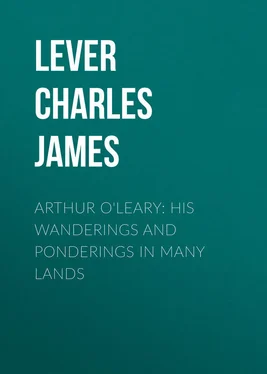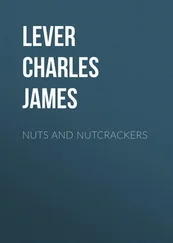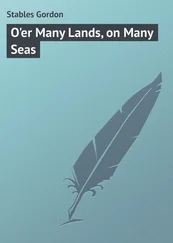Charles Lever - Arthur O'Leary - His Wanderings And Ponderings In Many Lands
Здесь есть возможность читать онлайн «Charles Lever - Arthur O'Leary - His Wanderings And Ponderings In Many Lands» — ознакомительный отрывок электронной книги совершенно бесплатно, а после прочтения отрывка купить полную версию. В некоторых случаях можно слушать аудио, скачать через торрент в формате fb2 и присутствует краткое содержание. Издательство: Иностранный паблик, Жанр: literature_19, foreign_antique, foreign_prose, на английском языке. Описание произведения, (предисловие) а так же отзывы посетителей доступны на портале библиотеки ЛибКат.
- Название:Arthur O'Leary: His Wanderings And Ponderings In Many Lands
- Автор:
- Издательство:Иностранный паблик
- Жанр:
- Год:неизвестен
- ISBN:нет данных
- Рейтинг книги:3 / 5. Голосов: 1
-
Избранное:Добавить в избранное
- Отзывы:
-
Ваша оценка:
- 60
- 1
- 2
- 3
- 4
- 5
Arthur O'Leary: His Wanderings And Ponderings In Many Lands: краткое содержание, описание и аннотация
Предлагаем к чтению аннотацию, описание, краткое содержание или предисловие (зависит от того, что написал сам автор книги «Arthur O'Leary: His Wanderings And Ponderings In Many Lands»). Если вы не нашли необходимую информацию о книге — напишите в комментариях, мы постараемся отыскать её.
Arthur O'Leary: His Wanderings And Ponderings In Many Lands — читать онлайн ознакомительный отрывок
Ниже представлен текст книги, разбитый по страницам. Система сохранения места последней прочитанной страницы, позволяет с удобством читать онлайн бесплатно книгу «Arthur O'Leary: His Wanderings And Ponderings In Many Lands», без необходимости каждый раз заново искать на чём Вы остановились. Поставьте закладку, и сможете в любой момент перейти на страницу, на которой закончили чтение.
Интервал:
Закладка:
“This, may it please your Excellency,” said Frank, trembling, “is a note of it; but I am ashamed that so trivial an account – ”
“Let us see – let us see,” said the minister.
“In good truth, I dare scarcely venture to read such a puerile detail.”
“Read it at once, Monsieur,” was the stern command.
Frank’s face became deep-red with shame, as he began thus: —
“Nine o’clock. – I see an ass coming along, with a child leading him. The ass is blind of one eye. – A fat German sits on the balcony, and is spitting into the Rhine – ”
“Ten. – A livery servant from Bâle rides by, with a basket. An old peasant in a yellow doublet – ”
“Ah, what of him?
“Nothing remarkable, save that he leans over the rails, and strikes three blows with his stick upon them.
“Enough, enough,” said M. de Louvois, gaily. “I must awake the king at once.”
The minister disappeared, leaving Frank in a state of bewilderment. In less than a quarter of an hour he entered the chamber, his face covered with smiles.
“Monsieur,” said he, “you have rendered his majesty good service. Here is your brevet of colonel. – The king has this instant signed it.”
In eight days after, was the news known in Paris, that Strasburg, then invested by the French army, had capitulated, and been reunited to the kingdom. The three strokes of the cane being the signal, which announced the success of the secret negotiation between the ministers of Louis XIV., and the magistrates of Strasburg.
This, was the Franz Holbein of the picture, and if the three coups de bâton are not attributable to his ghost, I can only say, I am totally at a loss to say where they should be charged; for my own part, I ought to add, I never heard them, conduct which I take it was the more ungracious on the ghost’s part, as I finished the schiedam, and passed my night on the hearth rug, leaving the feather-bed with its down coverlet quite at master Frank’s disposal.
Although the “Schwein Kopf” stands in one of the most prominent squares of Rotterdam, and nearly opposite the statue of Erasmus, it is comparatively little known to English travellers. The fashionable hotels which are near the quay of landing, anticipate the claims of this more primitive house; and yet, to any one desirous of observing the ordinary routine of a Dutch family, it is well worth a visit. The buxsom Vrows who trudge about with short but voluminous petticoats, their heads ornamented by those gold or silver circlets, which no Dutch peasant seems ever to want, are exactly the very types of what you see in an Ostade or a Teniers. The very host himself, old Hoogendorp, is a study; scarcely five feet in height, he might measure nearly nine, in circumference, and in case of emergency could be used as a sluicegate, should any thing happen to the dykes. He was never to be seen before one o’clock in the day, but exactly as the clock tolled that hour, the massive soup-tureen, announcing the commencement of the table d’hôte , was borne in state before him, while with “solemn step and slow,” ladle in hand, and napkin round his neck, he followed after. His conduct at table was a fine specimen of Dutch independence of character – he never thought of bestowing those petty attentions which might cultivate the good-will of his guests; he spoke little, he smiled never; a short nod of recognition bestowed upon a townsman, was about the extent of royal favour he was ever known to confer; or occasionally, when any remark made near him seemed to excite his approbation, a significant grunt of approval ratified the wisdom of the speech, and made a Solon of the speaker. His spoon descended into the soup, and emerged therefrom with the ponderous regularity of a crane into the hold of a ship. Every function of the table was performed with an unbroken monotony, and never, in the course of his forty years’ sovereignty, was he known to distribute an undue quantity of fat, or an unseemly proportion of beet-root sauce, to any one guest in preference to another.
The table d’hôte , which began at one, concluded a little before three, during which time our host, when not helping others, was busily occupied in helping himself, and it was truly amazing to witness the steady perseverance with which he waded through every dish, making himself master in all its details of every portion of the dinner, from the greasy soup, to that acmé of Dutch epicurism – Utrecht cheese. About a quarter before three, the long dinner drew to its conclusion. Many of the guests, indeed, had disappeared long before that time, and were deep in all their wonted occupations of timber, tobacco, and train-oil. A few, however, lingered on to the last. A burly major of infantry, who, unbuttoning his undress frock, towards the close of the feast, would sit smoking, and sipping his coffee, as if unwilling to desert the field; a grave, long-haired professor; and, perhaps, an officer of the excise, waiting for the re-opening of the custom-house, would be the extent of the company. But even these dropped off at last, and, with a deep bow to mine host, passed away to their homes, or their haunts. Meanwhile, the waiters hurried hither and thither, the cloth was removed, in its place a fresh one was spread, and all the preliminaries for a new dinner were set about with the same activity as before. The napkins inclosed in their little horn cases, the decanters of beer, the small dishes of preserved fruit, without which no Dutchman dines, were all set forth, and the host, without stirring from his seat, sat watching the preparations with calm complacency. Were you to note him narrowly, you could perceive that his eyes alternately opened and shut, as if relieving guard, save which, he gave no other sign of life, nor even at last, when the mighty stroke of three rang out from the cathedral, and the hurrying sound of many feet proclaimed the arrival of the guests of the second table, did he ever exhibit the slightest show or mark of attention, but sat calm, and still, and motionless.
For the next two hours, it was merely a repetition of the performance which preceded it, in which the host’s part was played with untiring energy, and all the items of soup, fish, bouilli , fowl, pork, and vegetables, had not to complain of any inattention to their merits, or any undue preference for their predecessors, of an hour before. If the traveller was astonished at his appetite during the first table, what would he say to his feats at the second? As for myself, I honestly confess I thought that some harlequin trick was concerned, and that mine host of the “Schwein Kopf” was not a real man, but some mechanical contrivance by which, with a trapdoor below him, a certain portion of the dinner was conveyed to the apartments beneath. I lived, however, to discover my error; and after four visits to Rotterdam, was at length so far distinguished as actually to receive an invitation to pass an evening with “Mynheer” in his own private den, which, I need scarcely say, I gladly accepted.
I have a note of that evening some where – ay, here it is – “Mynheer is waiting supper,” said a waiter to me, as I sat smoking my cigar, one calm evening in autumn, in the porch of the “Schwein Kopf.” I followed the man through a long passage, which, leading to the kitchen, emerged on the opposite side, and conducted us through a little garden to a small summer-house. The building, which was of wood, was painted in gaudy stripes of red, blue, and yellow, and made in some sort to resemble those Chinese pagodas, we see upon a saucer. Its situation was conceived in the most perfect Dutch taste – one side, flanked by the little garden of which I have spoken, displayed a rich bed of tulips and ranunculuses, in all the gorgeous luxuriance of perfect culture – it was a mass of blended beauty, and perfume, superior to any thing I have ever witnessed. On the other flank, lay the sluggish, green-coated surface, of a Dutch canal, from which rose the noxious vapours of a hot evening, and the harsh croakings of ten thousand frogs, “fat, gorbellied knaves,” the very burgomasters of their race, who squatted along the banks, and who, except for the want of pipes, might have been mistaken for small Dutchmen enjoying an evening’s promenade. This building was denominated “Lust und Rust,” which, in letters of gold, was displayed on something resembling a sign-board, above the door, and intimated to the traveller, that the temple was dedicated to pleasure, and contentment. To a Dutchman, however, the sight of the portly figure, who sat smoking at the open window, was a far more intelligible illustration of the objects of the building, than any lettered inscription. Mynheer Hoogendorp, with his long Dutch pipe, and tall flagon, with its shining brass lid, looked the concentrated essence of a Hollander, and might have been hung out, as a sign of the country, from the steeple of Haarlem.
Читать дальшеИнтервал:
Закладка:
Похожие книги на «Arthur O'Leary: His Wanderings And Ponderings In Many Lands»
Представляем Вашему вниманию похожие книги на «Arthur O'Leary: His Wanderings And Ponderings In Many Lands» списком для выбора. Мы отобрали схожую по названию и смыслу литературу в надежде предоставить читателям больше вариантов отыскать новые, интересные, ещё непрочитанные произведения.
Обсуждение, отзывы о книге «Arthur O'Leary: His Wanderings And Ponderings In Many Lands» и просто собственные мнения читателей. Оставьте ваши комментарии, напишите, что Вы думаете о произведении, его смысле или главных героях. Укажите что конкретно понравилось, а что нет, и почему Вы так считаете.












